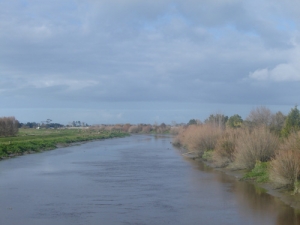Double Standard
OPINION: The proverbial has really hit the fan in Wellington and exposed a glaring example of a double standard in environmental accountability.
 The efforts of farmers to improve the health of the Piako River in Waikato region have been recognised.
The efforts of farmers to improve the health of the Piako River in Waikato region have been recognised.
The efforts of farmers to improve the health of the Piako River in the Waikato region have been recognised.
The award of the Waikato region's most improved river to the Piako River follows a significant effort by farmers in the catchment to lessen the environmental impact of their operations, says Waikato Regional Council chairperson Paula Southgate.
Southgate attended the Morgan Foundation's annual River Awards in Wellington last night where the award was presented.
"This work by farmers, landowners and industry groups in both the Piako catchment and other parts of the region, is crucial to improve the health of our precious waterways, lakes and groundwater, and should be celebrated," she says.
This year the most improved rivers were determined by the trend decline in dissolved inorganic nitrogen (DIN). The Piako showed a 6.8% trend decline in DIN over the ten years to 2014.
The foundation noted that the Piako catchment is dominated by pastoral farming - mainly dairying and stock finishing. The water quality monitoring site is downstream of Morrinsville and the town's wastewater discharge to the river, and a number of dairy company discharges also. The river flows out past Ngatea to the Firth of Thames.
"The Piako catchment is 95% pasture. It is one of the most intensively farmed (dairy) areas in New Zealand and always has been. Council records confirm ammonia and nitrates levels in the river have declined over the past 10 and 20 years. Improvements in dairy shed management practices have contributed to the observed improvement in water quality," the foundation said.
It noted dairy farmers have increasingly moved away from dairy shed oxidation ponds towards discharging treated effluent on to the land. The oxidation ponds had discharged into the nearest drain, and thus contributed ammonia and nitrogen to nearby waterways.
"Across the Waikato only five per cent of dairy farms now have oxidation ponds so the era of easy wins...is now probably over," the foundation said, adding that the source of 70% of nitrogen is from cow peeing in the paddocks "so further improvements are going to rely on changes in farm management practices".
Southgate says the council is working closely with the farming community and others in a variety of ways to lessen the sector's impacts on waterways, while potential regional plan changes to protect them were either being formulated or in the pipeline.
The Meat Industry Association of New Zealand (MIA) today announced that Chief Executive Officer Sirma Karapeeva has resigned from the role.
The winners of the 2026 Hawke’s Bay/Wairarapa Dairy Industry Awards were announced at the annual awards dinner held at Copthorne Solway Park in Masterton on Thursday evening.
Environment Southland is welcoming this week’s decision by the Environmental Protection Authority (EPA) to approve the release of Blaptea elguetai, a leaf‑feeding beetle that will help control the highly invasive Chilean flame creeper.
This March, the potato industry is proudly celebrating International Women’s Day on 8 March alongside the International Year of the Woman Farmer, recognising the vital role women play across every part of the sector — from paddocks and packhouses to research, leadership, and innovation.
Fruit trader Seeka posted a record profit and returns to shareholders in 2025.
Recent weather events in the Bay of Plenty, Gisborne/Tairawhiti, and Canterbury have been declared a medium-scale adverse event.
OPINION: Staying with politics, with less than nine months to go before the general elections, there’s confusion in the Labour…
OPINION: Winston Peters' tirade against the free trade deal stitched with India may not be all political posturing by the…